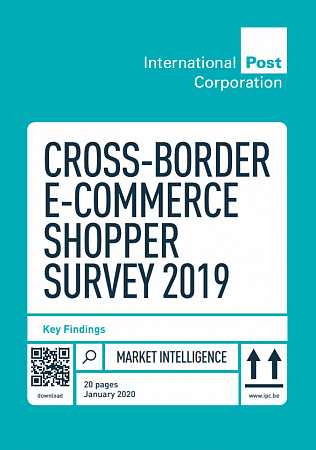The research took place in September 2019 and the analysis and reporting was conducted by IPC. It was based on an online survey 15-minute questionnaire, 41 countries were surveyed, and 35,737 online cross-border consumers responded. Each year the survey questionnaire is reviewed by IPC in cooperation with research experts from its members. There was a deep dive into the topic of sustainability in this year report. The findings show that 47% of global consumers strongly agreed they would like the packaging of their parcels to be recyclable and expressed a strong preference to receive parcels in cardboard as opposed to plastic. Consumers also strongly agreed that they would prefer the delivery of their parcels to be carbon-neutral and that they would be willing to receive packages a few days later to reduce the environmental impact.
Analysis shows that of the parcels bought cross-border in 2019, 39% were purchased from China, 14% from the US, 10% from the UK and 9% from Germany. As in previous years of the survey, China is clearly the primary e-commerce exporter worldwide.
Overall, the most popular e-retailers for cross-border purchases were Amazon (25%), Alibaba (20%), eBay (14%) and Wish (11%). The majority (86%) of cross-border parcels weighed up to 2kg and 44% of goods purchased cross-border cost less than €25. For the first-time consumers were asked specifically about Amazon Prime and 28% of all respondents said they were a member.
The 2019 survey measured consumer satisfaction with six key elements: Delivery cost, Delivery location, Tracking, Delivery speed, Customs and Returns. Of these six elements, Delivery speed clearly had the lowest level of consumer satisfaction. This was the case in almost all 41 surveyed markets. The most common delivery speed for cross-border purchases was 15-29 days (20%), with 11% of respondents having to wait 30 days or more for their purchase to arrive. When asked for the cost of delivery for their most recent crossborder e-commerce purchase, 63% of respondents received free shipping. The most commonly used location was delivery to the home (66%) and the most important delivery element was «Clear information about delivery charges before purchase», which was very important to 66% of respondents.
IPC states that they will continue to work in partnership with its members, other postal operators and organizations to expand the survey to new markets in the coming years, because understanding trends in consumer cross-border preferences and experiences is crucial for postal operators to develop and improve their delivery services to meet the needs of global consumers and e-retailers.
The full version is attached to the article.





